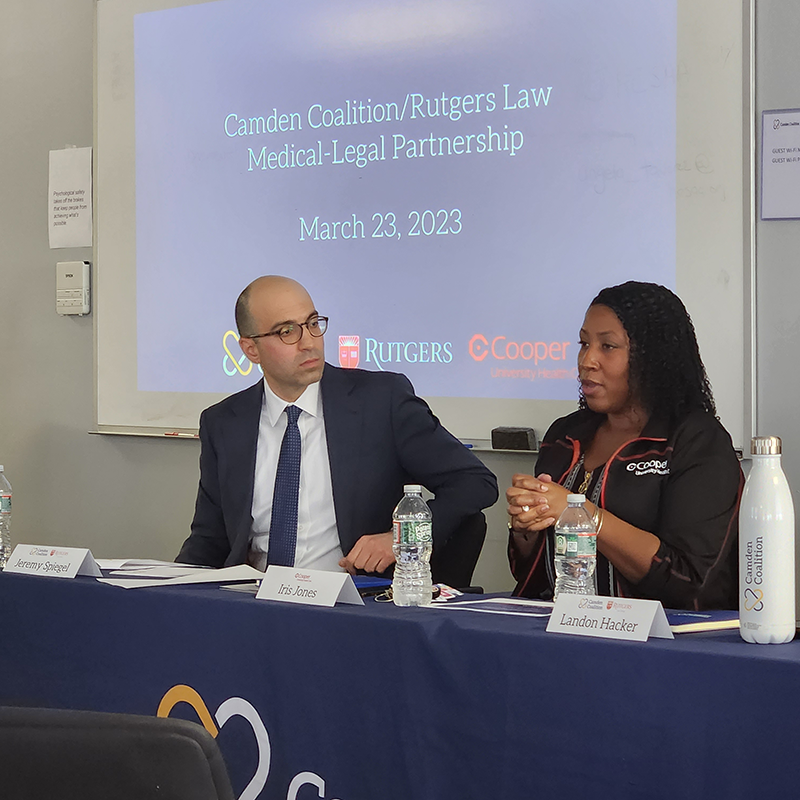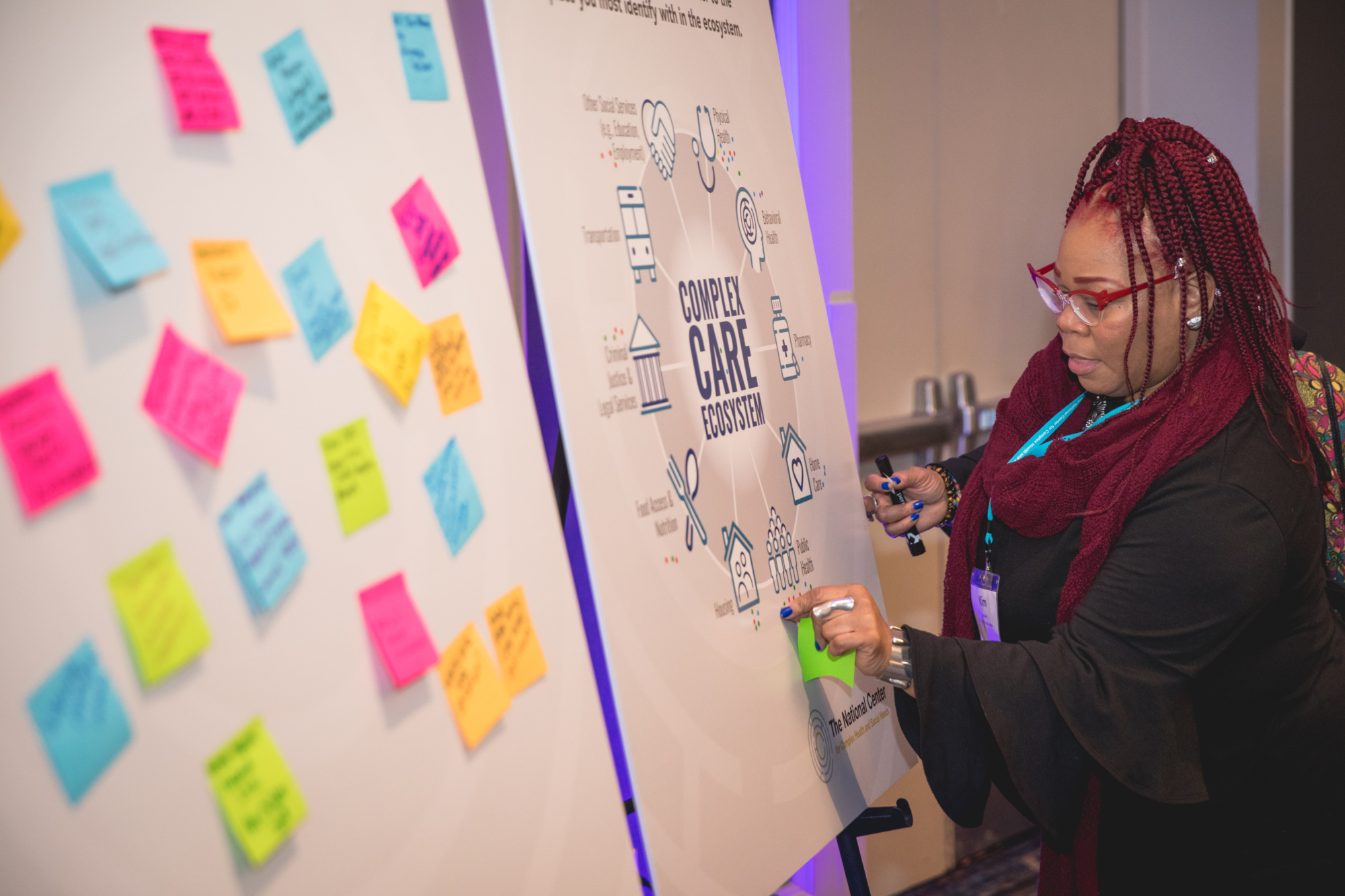Camden Coalition Medical Legal Partnership at Cooper Center for Healing
Care management & redesign Strengthening ecosystems of care Behavioral health & addiction Legal & criminal justice

This resource is a part of our “snapshot” series. A snapshot is a point-in-time window into our process for developing, testing, and implementing programs and partnerships. Snapshots let us share our hypotheses, workflows, and early observations and findings quickly with other innovators who are interested in what’s happening on the ground right now.
For more up-to-date and comprehensive information about Medical Legal Partnership, please visit the Medical Legal Partnership page.
Issue:
Legal issues can be a major barrier to health and recovery for many with complex health and social needs — particularly for people seeking treatment for addiction and substance use disorders.
Project goal:
Improve the well-being of patients at Cooper Center for Healing by addressing legal issues that are posing barriers to their recovery, with the longer-term goal of demonstrating the feasibility and efficacy of the medical-legal partnership model in behavioral health settings.
Project partners:
Camden Coalition, Cooper Center for Healing, Rutgers Law School (Maida Public Interest Fellowship)
Background:
Since the launch of the Camden Coalition/Rutgers Law School-Medical-Legal Partnership (MLP) in 2017, Camden Coalition attorneys and care team members have worked closely with the staff of Cooper Center for Healing to provide care for our overlapping patient populations. Cooper Center for Healing is an integrated care center providing care for patients with substance use disorders, pain, trauma, and psychiatric disorders. This pilot took advantage of our MLP program’s increased capacity — due in part to the addition of a Maida Public Interest Fellow — to formalize and deepen the relationship between the two programs.
This pilot took shape against the backdrop of the country’s ongoing opioid epidemic, which has particularly impacted the Camden community (Foo, et al, 2017), as well as increasing interest on the federal level in the medical-legal partnership model (Biden, 2021).
Project design:
In 2022, we entered into a memorandum of understanding (MOU) with Cooper Center for Healing to take direct referrals from Cooper for patient legal needs. In turn, Cooper agreed to collaborate with our MLP team, make space within their clinic for confidential MLP client meetings, and support the work monetarily. One key aspect of the pilot is that it replicates earlier work of our MLP where the attorney becomes another member of the larger care team.
Most referrals happen onsite when patients come in for treatment. Cooper Center for Healing’s care team members, which include medical providers, navigators, and social workers, identify potential legal issues that come up in conversation with patients, and ask patients if they are interested in receiving legal help. Our lead attorney for this partnership then meets privately with each referred patient to determine legal needs and collaboratively create a course of action.
This MLP pilot is unique among medical-legal partnerships across the country in that our attorneys provide direct representation in defending criminal matters. We decided to take on those matters because we did not believe we could provide comprehensive legal support to patients overcoming substance use disorder without addressing justice involvement. In other words, we hypothesized that their chances of improving their health was greater if the MLP attorney addressed pressing civil and criminal issues.
Other legal services provided include defense representation for evictions and other housing matters, legal advice around securing public benefits, appeals for benefits denials, and issues regarding court fines and fees. Our attorney also works with Cooper Center for Healing’s navigators to help patients fill out paperwork and navigate bureaucratic processes.
Progress to date:
From February 2022 through January 2023, our MLP received 180 referrals from Cooper Center for Healing. Each referred patient received at minimum a meeting or phone call. Approximately 25% required substantive engagement over a period of weeks or months. Many others required a series of phone calls or letters to resolve their legal issues.
Over 40% of referrals concerned criminal or municipal matters. These cases primarily involved low-level charges related to poverty and drug use, including drug possession and shoplifting. The next largest category was housing, primarily eviction defense. Third was family law, including custody, visitation, and child support issues, as well as obtaining restraining orders for domestic violence.
In our criminal defense work, we have achieved favorable outcomes for Cooper Center for Healing participants. We attribute this to a number of factors, including our attorneys’ insight into clients’ medical conditions, treatment, and recovery. Particularly valuable is our collaboration with the Center for Healing team – both to understand medical matters and bring in evidence relating to clients’ recovery. An emphasis on our clients’ hard work and progress in their recovery, especially with the backing of treating professionals, provides for powerful advocacy.
So far, we have received positive feedback from Cooper Center for Healing patients and staff members about our MLP services. From November 2022 through February 2023, we interviewed five patients about their experiences receiving legal services, and heard overwhelming appreciation for the ways that access to legal services enhanced their recovery and wellbeing. We are hoping that we can incorporate a more formal evaluation into the MLP pilot.
[After getting my record expunged], I'm not afraid to pursue the career and education of my choice. Now I don't have to worry about anything holding me back.MLP client from Cooper Center for Healing
Next steps:
In 2023, we will continue the MLP pilot work and also plan to embark on a formal evaluation of this project in partnership with Cooper Center for Healing.
Related blog posts
Medical-Legal Partnership: When legal issues are barriers to care
Removing legal barriers to good health
Related resources



Camden Coalition Medical-Legal Partnership: Year one analysis of civil + criminal MLP model in addiction medicine setting
Care management & redesign Strengthening ecosystems of care Behavioral health & addiction Legal & criminal justice Measurement & evaluation
Why inequitable and burdensome court-issued fines and fees are a health issue – and what health and policy leaders can do about it
Care management & redesign Legal & criminal justice Policy & advocacy
Addressing addiction at the Camden Coalition
Care management & redesign Strengthening ecosystems of care Behavioral health & addiction